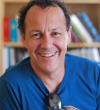The Origin of Love
Sue Carter, Indiana University; Department of Psychology, University of Virginia
Pascal Gagneux, UC San Diego
Summary:
Human beings show a range of emotional attachment, affection, and infatuation often referred to as “love.” Love promotes long-lasting and secure relationships that involve nurturing and support. Biological mechanisms underlying such behavior involve ancient neuropeptides and their receptors in the brain. These systems are also involved in reproduction, ranging from mating and pair-bonding, to giving birth and lactation. They shape the earliest experiences of all mammals and their mothers. The concept of love and how we experience it are affected by culture and its diverse societal norms. This symposium will explore the evolutionary roots of human love, compare human love to corresponding emotions in other animals, consider human conditions that prevent the expression of such feelings, and examine the key role of love and affection for our development and daily lives.
Media for each talk can be played by clicking on icons in the table below, or by clicking on the individual talk titles below and then the attachment file at the bottom of the page.
| Speakers | Media | Session |
|---|---|---|
 Carol Marchetto  Pascal Gagneux |
|
Welcome & Opening Remarks Welcome by CARTA Internal Advisor, Carol Marchetto. Opening remarks by CARTA Executive Co-Director and Event Co-chair, Pascal Gagneux. |
 Sue Carter |
|
The healing power of love: The oxytocin hypothesis Oxytocin is a peptide molecule with a multitude of physiological and behavioral functions. Based on its association with reproduction, including social bonding, sexual behavior, birth and maternal behavior, oxytocin also has been called “the love hormone.” This presentation will examine parallels between the healing power of oxytocin and love. As described here, many myths and gaps in knowledge remain concerning oxytocin and love. A few of these are described and we hypothesize that the... read more |
 Karen Bales |
|
Love, loss, and luminance Close relationships help us shape both our other social interactions as well as our internal physiology. Do these close relationships, also known as pair bonds, look and function similarly in species as diverse as titi monkeys, prairie voles, seahorses, and humans? How do negative experiences such as loss factor into, and perhaps strengthen, our close relationships? And what do we mean by luminance? The current talk will explore these topics while also touching on the underlying neurobiology... read more |
 Karen Parker |
|
Is vasopressin the key to unlocking our understanding of autism? Humans are an intensely social species. We experience social interactions as rewarding from infancy, and the social cognitive skills that we develop in the context of our earliest interpersonal attachments are critical for our survival and personal wellbeing. Lack of social connection is common in many psychiatric and neurodevelopental disorders. In some disorders, like autism spectrum disorder, social cognition and social interaction impairments are the defining, core feature. Yet, despite the... read more |
 Eduardo Fernandez-Duque |
|
Love, monogamy, and fatherhood in Latin American monkeys The titis, and owl monkeys of South America live in socially-monogamous groups where the male and female establish a pair bond and share parental duties. Why do males of these species mate in a monogamous relationship presumably foregoing other reproductive opportunities? And why are titi and owl monkey males such good fathers, investing heavily in the care of offspring that they cannot be certain they sired? Relying on ecological, behavioral and genetic data collected during 28 years from... read more |
 James Rilling |
|
The biology of grandmaternal love Grandmothers are important alloparents in many human families. According to one prominent hypothesis, the inclusive fitness benefits of grandmaternal caregiving selected for an extension of the human female lifespan up to decades beyond the cessation of reproduction – a developmental stage that is unique among primates. Beyond this extension of the lifespan, it is possible that grandmothers harbor other biological adaptations that prepare them for a special role in caregiving. In this talk, I... read more |
 Constantina Theofanopoulou |
|
Oxytocin’s pathway to the origins of speech and dance Dr. Theofanopoulou’s research focuses on unraveling the neural circuits underlying complex sensory-motor behaviors that drive social communication, particularly speech and dance, while exploring effective drug- and arts-based interventions for sensory-motor deficits commonly associated with brain disorders. In her lecture, she will discuss her brain imaging studies that identified overlapping regions in the primary motor cortex responsible for controlling muscles relevant to both speech and... read more |
 Ruth Feldman |
|
The biology of hatred: Why love turns to hatred and what we can do about it Ancient texts warn us that love can quickly turn into hatred. We hear of Cain and Abel, Medea murder of her children, and “Et tu, Brute?” still rings the bitter sound of friendship turned betrayal. In this talk, I'll present our theoretical perspective on the neurobiology of hatred that is based on our model on the biology of human love and its three foundations; the oxytocin system, the attachment network in the brain, and biobehavioral synchrony, the process by which humans create a coupled... read more |
 Lee Gettler |
|
The biology of fatherhood in humans: Evolutionary origins and cross-cultural perspectives Human fathers have a flexible psychobiological capacity to respond to committed parenting with shifts in hormones such as testosterone, prolactin, and oxytocin. Across non-human species that have evolved costly forms of paternal care, such hormonal shifts often help to mediate trade-offs between mating and parenting effort. These findings hint at evolved neuroendocrine capacities that help facilitate refocused priorities as men make the transition into fatherhood. Today, fathers commonly... read more |
 All Speakers  Sue Carter  Pascal Gagneux |
|
Wrap-up, Question & Answer Session, and Closing Remarks Question and answer session with all speakers. Wrap-up by Event Co-chair, Sue Carter. Closing remarks by Event Co-Chair and CARTA Executive Co-Director, Pascal Gagneux. |
If you enjoy this event, please consider supporting CARTA's quest to explore and explain the human phenomenon.


